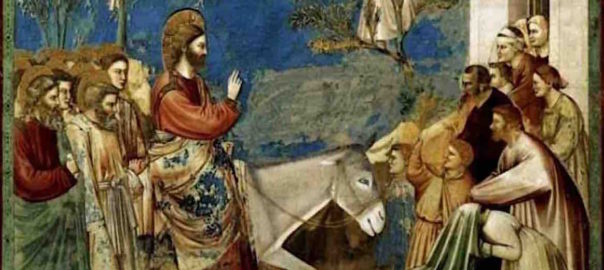
Dear friends,
Here are some thoughts I composed for our church as we walk in the steps of Jesus this Holy Week. In the midst of our current crisis, it settles our hearts to remember all that Jesus has done for us. Thank you for your prayers and support as we seek God’s glory and the good of others.
Introduction
From the 2nd Century AD to this moment, Christians of all nations and traditions have understood the Passion of Christ as the central narrative of the Gospel. From the triumph and tears of Palm Sunday to Jesus’ victory over death, hell, and the grave on Easter Sunday, Holy Week has been a part of the church’s devotional reflection and evangelistic mission. Each day we will follow our Lord as he walks in obedience. With the Help of the Holy Spirit, we can find new intimacy with the Lord, hope for our circumstances, and wisdom for navigating life’s challenges. Each daily reflection will begin with the key passages from the Bible. This is followed by the main ideas in the passages. Finally, we will consider the applications arising from the Word. Welcome to a special week!
Palm Sunday (April 5, 2020)
Key Scriptures: Matthew 21:1-17; Mark 11:1-19; Luke 19:28-47; John 12:12-19
This first day of Holy Week or the Passion is a moment of celebration as Jesus fulfills prophecy and receives worship. In these moments of celebration, Jesus surprises all around with his humility – riding on a young donkey – and his authority – commending the worship and cleansing the Temple.
This moment of public exuberance will not last, as many in the crowd will be indifferent or hostile to our Lord just days later. Even as Jesus approaches the Holy City, he weeps over the refusal of most of God’s ancient people to understand the special moment of God’s kingdom in the person and work of Jesus. God’s Anointed One – the Messiah (the Christ) is here! God’s blessings of love and justice, joy and forgiveness, deliverance and healing are here…but without the military and political power. The first coming of Jesus focuses on liberation from sin and eternal death. The second coming will bring complete restoration (See Hebrews 9:23-28).
It is important that we have our expectations informed by God’s word and not our feelings or the daily news. We know God is faithful and we know that the Lord is working in all circumstances (romans 8:28-39). We must expect the Lord to do great things and endure suffering at times. The crowds in Jerusalem wanted the victory without the sacrifice.
Will we welcome King Jesus on his terms of holiness and humility? Will we clear the way for all to come to faith in the Lord, making room in our hearts and homes for new friends and
members of God’s forever family? Let’s take a moment and praise the Lord for his goodness and power, love and mercy, and the promises on which we can place our lives. He is faithful!
Holy Monday (April 6)
Key Scriptures: Matthew 21:12-22; Mark 11:1-14; 14:3-11; Luke 19:45-46; John 12:1-11
On this second day of the week, scholars and church tradition place the anointing of Jesus with oil at Bethany here, along with the cursing of the fig tree and cleansing of the Temple. We also discover in John’s Gospel that some leaders are planning to kill Lazarus – Jesus’ friend he had raised from the dead – because Lazarus’ testimony was leading too many people to believe in Jesus.
The anointing of Jesus with expensive perfumed oil was considered extravagant by the religious – and received as a beautiful expression of love by our Lord. Jesus is not being wasteful; he is receiving the highest sacrifice that this repentant follower could offer.
The cursing of the fig tree was a symbolic act, representing God’s judgement on those who – in spite of many invitations – refuse to believe. In today’s world, many are uncomfortable with the reality that some will enjoy God’s presence forever by their own choices. Our loving Lord is persuasive and powerful and constantly wooing people to himself. But in the end, following Jesus is voluntary.
The Cleansing of the Temple was an act of divine judgment on some of the religious leaders and practices, especially the unfair treatment of Gentile converts to Judaism and God-fearing people desiring to know the Lord and experience his presence. The moneychangers were making it more expensive for certain groups to participate. Jesus prophetically prepares the way for the new temple – not a building of human hands but the expanded people of God, including all Jews and non-Jews that place their faith in Jesus (See Ephesians 2).
Will we offer our lives extravagantly to the Lord, submitting all our time, treasure, and talent to him? Will we make sure we place no barriers to fellowship and ministry in the way of anyone, regardless of background? Will we aim for fruitful obedience and total dependence on the Lord, and refuse to exchange godliness for greed?
Holy Tuesday (April 7, 2020)
Key Scripture: John 12:20-50
In John’s Gospel, chapter 12 marks the final moments of Jesus’ public ministry before he retreats with the disciples to the Upper Room and spends several chapters ministering to “his
own” (John 13:1-6). Some believe that the early moments of John 13 may have occurred on Tuesday evening, though others place John 13-17 on Wednesday and Thursday nights.
Beginning with verse 20, Jesus responds to some Greek inquirers and offers a brilliant summary of his true glory – his “lifting up” on the Cross and the healing that will flow from this moment (John 12;20-33). There is a deep sadness on this day as John reminds us that rejection of Jesus was prophesied hundreds of years ago (John 12:34-41). In spite of much opposition, there were some timid believers that kept their faith quiet and the writer is clear this is not honoring to God (12:42-43).
John 12:44-49 represents a final plea of Jesus – and therefore the author as well (John wrote his Gospel and Epistles toward the end of his long life) for all to believe and come into the true light (see John 1:1-18) of spiritual rebirth and eternal life.
John recorded these words of Jesus to encourage us as we face many pressures to doubt and be afraid (especially in this pandemic moment). We are also encouraged toward boldness, not covering up our love for the Lord and his invitation for all who believe. Will we take time and share about the Lord with someone this week? Will we trust God even in hard circumstances? The Lord is with us and he will honor us as we honor him.
And, taking a peek at John 13, will we respond to Jesus’ love on the Cross and live under Christ’s “new” command to “love one another, as I have loved you”?
Holy Wednesday
Key Scriptures: Matthew 26:1-5; Mark 14:17-21; Luke 22:1-6; John 13:21-30
Sometimes called “Spy Wednesday” – this is the moment Judas is paid to betray Jesus. The celebration known as Tenebrae (shadows, deepening darkness) occurs Wednesday evening into early Thursday morning. Religious leaders conspire to silence Jesus and there is a tangible tension as Jesus, aware of all these events, still washes feet and shares bread with his betrayer (Judas Iscariot) and future denier (Peter).
The Gospels reveal Judas’ fiscal dishonesty and portray him in a negative light from the first lists of Jesus followers (Luke 8) to the final drama of his hypocritical kiss, deep regret, and eventual death. How did Judas go from hand-picked follower to, “the son of perdition”? Yes, it was the Lord’s plan that Jesus deliberately offer his life as a sacrifice for our salvation (Isaiah 52-53; Mark 10:45; John 10:10-18; Acts 2-3), but there is still freewill at work in Judas’ life.
The late Campbell McAlpine, renowned Bible teacher and leader, offers these insights into Judas…and they serve as a warning to our own hearts: First, Judas became offended when he realized that Jesus’ Messiahship was not going to mean immediate political power for himself and the disciples. Second, Judas became disloyal. He helped himself to the treasury and plotted
with the leaders to arrest Jesus. Finally, Judas betrayed his Master with a kiss. Notice the progression: offense, disloyalty, betrayal.
May the Lord help us guard our hearts when we are disappointed and hurt, lest we nurture an offense in our hearts and become disloyal to the Lord, other believers, and God’s church. Will we remain faithful, even when circumstances disappoint our expectations? Will we trust that Jesus is still the Light when shadows fall around us? We have a wonderful High Priest Jesus who is praying for us (Romans 8; Hebrews 4, 9-10; I John 1-2), and by the power of the Holy Spirit, we can agree with him and bless others.
Maundy Thursday
Key Scriptures: Matthew 26:26-75; Mark 14:22-72; Luke 22:14-71; John 17:1-18:27
We are now in the central act of this divine drama of salvation. Notice the extensive details in all the Gospels. Floyd McClung, summarizing our Lord’s Passion, declared, “The Lord used a criminal act of evil persons against an innocent man and turned this into the foundation of their forgiveness.”
This is the moment of Jesus’ agonizing prayer and personal decision to take up the Cross. In Matthew, Mark, and Luke, we have a window into Jesus’ human feelings. Jesus knew it was God’s plan, yet the suffering (and horrible separation) of the Cross caused him to cry out to the Father…and after his cry, to submit to God’s plan for our salvation. We were the “joy set before him” (Hebrews 12:1-3) that propelled this decisive act of love. As he is crying out, John 17 lets us know that he is interceding for both his immediate disciples and for all believers. Jesus prays that we would be holy, united, and walk in love, just as God is holy, one and love.
We also see Peter denying Jesus and then repenting of his cowardice. In Luke 22:31-34 Jesus predicts Peter’s denial – and eventual restoration! This is why the Mark 16:7 tells the astonished women, “Go tell the disciples and Peter…” that Jesus is alive. This is why Jesus askes Peter three times in John 21, ‘Do you love me?” With each affirmation of Peter, Jesus restores and commissions. What a wonderful Lord we have who restores us when we cry out to him.
Jesus is arrested and his (mis)trials begin. First, he appears before the religious leaders and remains mostly silent as they accuse him of blasphemy as he affirms that he is the Messiah and King. The religious leaders were threatened by Jesus’s words and works Their delicate political situation with the Roman Empire would be threatened if the people rallied around Jesus as King. As evening turns to morning, the final trials come.
As we ponder the pathway of our Lord, will we choose divine love over human power, offering our lives for God’s glory and the good of others? Today is a good day to bring all past mistakes and regrets that still haunt our memories and realize that we serve a God of restoration. Though not all consequences are always removed, we can live with a clean conscience and hope for the future because Jesus is praying for us.
Good Friday
Key Scriptures: Matthew 27:1-61; Mark 15; Luke 23; John 18:28-19:42
Why is this moment of horrific, undeserved suffering called, “Good Friday” by all Christians? Because even though our Lord is condemned to a Cross, with a weak Roman leader capitulating to the paid-for-mob and jealous religious leaders, our salvation is secured though this deep suffering. Our Lord bears all of humankind’s sins and sorrows, sufferings and sicknesses, unspeakable evils and unanswered questions as he atones for humankind. “It is finished” indeed! At the very moment darkness appears to win, forgiveness and reconciliation are secured (See Romans 3:21-5:21).
Our Lord’s final mistrial is before Pilate – a poor leader who would prefer to beat Jesus and release him rather that have a martyr on his hands. Pilate knows Jesus is innocent of any capital crime and he is perplexed by this humble Rabbi claiming divine authority but not questioning Pilate’s civil leadership. But corruption and fear win the day and Pilate hands Jesus over to a squad of soldiers for crucifixion.
In addition to an unmerciful beating and the taunts of the soldiers, Jesus must carry the cross beam to Golgotha, the Place of the Skull, where criminals die a lingering death. Jesus is so physically weak that Simon of Cyrene (located in North Africa) is plucked from the crowd to carry the beam, leaving his two sons among the watchers. Though weak, Jesus finds time to comfort weeping women on his bloodstained pathway.
Jesus is on the Cross from 9 AM to 3 PM, with the final three hours full of unspeakable suffering. For the first time in all eternity, fellowship with the Father is broken (“My God, my God, why have you forsaken me?”) as Jesus bears our sins. He is suffering between two criminals. One curses; the other humbly pleas for mercy. Jesus promises the latter that they will enjoy God’s presence together in just a few hours, “Today, you will be with me in Paradise.” While on the Cross, Jesus forgives his tormentors, makes provisions for his Mother, refuses drugged wine, accepts a drink of water, and, at the very end, declares, “It is finished!” and “Father, into your hands I commit my spirit.”
As Jesus utters his final words, in the Jewish Temple, the veil into the Holy of Holies is torn, symbolizing access for all who believe and a New Covenant. The very moment our adversary thought was his victory, becomes our salvation! “It is finished!” means all sins are covered, for in this one sacrifice, God’s love and justice are fulfilled and all who believe are forgiven and granted favor (Roman 5:1-11; Hebrews 7-10).
Jesus is hastily buried in a borrowed tomb as the Sabbath approaches. The tomb is sealed and guarded and Jesus’ followers scatter, wondering what the future may hold.
What does the Lord ask of us as we consider all this? He calls us to believe, turn from our selfishness and sins, and humbly say thank you with obedience to his commands – summed up in the command to love God and neighbor (Acts 2:38; Romans 10:9-10; Matthew 22:37-40; Ephesians 4:1-6). Just as Jesus submitted to a pathway of service for us, will we reframe our lives for God’s glory and the good of others?
Holy Saturday
Key Scripture: Matthew 27:62-66; Luke 23:56
This Sabbath Day is a hush, a pause to catch our breath…and a critical moment of verifying that Jesus was not, “only mostly dead.” Jesus died on Good Friday and was hastily wrapped and placed in a borrowed tomb before the sundown on Friday. Political and religious leaders sealed the tomb and posted a guard, lest the body be stolen.
Why does this day matter? Theologically, we know that Jesus’ work for our salvation was completed on the Cross (“It is finished”). In one sense, the Resurrection could have happened a millisecond after Jesus’ death. But in the plan of God, it was vital that Jesus’ death and sealed tomb be certified by witnesses so that the full power of his eventual triumph over death can be seen in all its glory.
It is important that we not add to God’s Word about our salvation. Some well-meaning Christians believe that after Jesus died, there was some kind of spiritual battle in Hades and Satan had to be defeated and “the keys” snatched from his hand. These speculations arose in the early Medieval times with an addition to the Apostles’ Creed that says, “he descended into hell [hades, the place of the dead].” This is not in the New Testament or any other creed. Ephesians 4:1-11 reminds us the Lord who triumphed over the grave is the same one who descended all the way…in his incarnation in Mary’s womb (see Psalm 139 for the meaning of “depths of the earth”). In I Peter 3, Jesus did not go and preach to the dead – rather, Peter is illustrating how Noah’s pleas with evil people anticipated the gospel.
When Jesus died on Good Friday, his spirit was immediately in Paradise and his body was physically in the tomb. The same is true when a believer dies today. She or he is in God’s presence, while awaiting the final resurrection when Jesus returns in glory (2 Corinthians 5; I Thessalonians 4-5).
As we reflect on this moment of waiting, we are challenged to trust the Lord for his timing in our lives. We are called to cease from our own efforts and enter his rest of faith (Hebrews 2-4). In our busy world, waiting is a particularly challenging discipline.
EASTER SUNDAY
Key Scriptures: Matthew 28; Mark 16; Luke 24; John 20-21; Acts 1:1-11; I Corinthians 15
Every Easter, around the world, billions of believers declare to each other, “He is Risen!” and respond with, “He is Risen, indeed!”
“Every Sunday is Easter when believers realize they live in the Spirit and begin to experience new life today, even while waiting for the Return of the Lord.” (Gordon Fee). Here we see victory over every opposing power, especially death and the fear of death. In our Risen Lord, we see a preview of our future – real, transformed bodies and spirits ready to worship and work under the reign of Christ (Romans 8; Colossians 1:15-22). Easter is not a psychological projection of wishful thinking (the disciples were astonished), or some kind of spiritual apparition (Jesus invited Thomas to touch him and served breakfast at the seashore).
The Gospels all record the astonishment of the women at the tomb as they discover Jesus is alive. All the Gospels detail of awe of the disciples as they see the Lord and begin to realize (again) that God’s kingdom is present in ways they did not expect (Acts 1). The political and religious opponents spread rumors that the disciples stole the body…and these rumors persist into the 21st century. Eventually, as many as 500 will witness the Risen Lord.
There is no historical event more studied and more attacked that the Resurrection. If it can be undermined and found false, the entire Christian message has no meaning and power (I Corinthians 15). Why should anyone suffer if Jesus is just a good Rabbi and martyr? If it is true, we see in the Risen Jesus a preview of the future of every believer and validation that death does not have the final word!
Jesus appears to his followers, instructing them about the kingdom, commissioning them to make disciples (Matthew 28:18-20; Mark 16:15; Luke 24:44-49; John 20:19-21; Acts 1:8), and reassuring them that he will be present with them through the Person of the Holy Spirit (John 14-16; Luke 24:44-47; Acts 1:8; 2:4).
No matter what our trials, we have a hope that is rooted in history and we have victory over sin and sorrow through the Holy Spirit. We can expect a life of resurrection power and suffering (Philippians 3), a life filled with the miraculous and with punctuated by real challenges.
The certainty of the Resurrection is what caused this small group of Jesus followers to become millions of Christians. The Resurrection proclaims that God is working now to restore all things and invites all believers to join is this mission of reconciliation and repair (2 Corinthians 5:18-6:2). Will we joyfully receive the work of the Holy Spirit in our life and begin to live the future now, sharing our faith, doing good, and honoring God in all we do?




